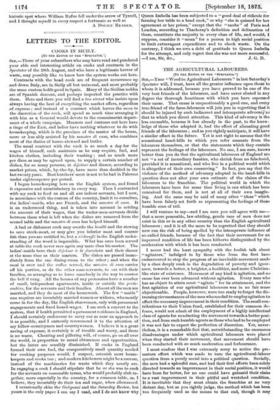LETTERS TO THE EDITOR.
COOKS IN SICILY.
[TO THE EDITOR OF THE "SPECTATOR.")
SIR,-TIIOSO of your subscribers who may have read and pondered your able and interesting article on cooks and contracts in the Spectator of the 28th August, and who have a legitimate horror of waste, may possibly like to know how the system works out here.
Contracts with the head cook are of frequent occurrence up and down Italy, are in Sicily all but universal, and most probably the same custom holds good in Spain. Many of the Sicilian nobles are of Spanish descent, and perhaps imported the practice with them. Here and there you will find a bon vivant who insists upon always having the best of everything the market offers, regardless .of expense ; and instead of a contract which leaves the menu to the discretion of the cook, will spend as much time arranging it with him as a General would devote to the commissariat depart- ment of a whole campaign. Manners and customs out here have a tinge of the East, and ladies have nothing whatever to do with housekeeping, which is the province of the master of the house, more or less ably assisted by his maestro di cam, who combines most of the duties of house-steward and butler.
The usual contract with the cook is so much a day for the wages of himself, such assistants as he may require, fuel, and kitchen clothes, including their washing ; and so much more per diem as may be agreed upon, to supply a certain number of dishes, for so many persons, at dejeiiner and dinner, according to market prices, which, by-the-by, have more than doubled in the last twenty years. Best butchers' meat is not to be had in Palermo under eighteenpence per pound.
I began housekeeping here on the English system, and found it expensive and unsatisfactory in every way. Then I contracted with my cook to feed us and all our indoor servants, but I now, in accordance with the custom of the country, limit it to ourselves, the ladies'-maids, who are French, and the maestro di casa. It is an understood thing, and is taken into account in settling the amount of their wages, that the under-men-servants divide between them what is left when the dishes are removed from the second table and the maestro di casa has helped himself.
A bad or dishonest cook may overdo the bouilli and the stewing to save stock-meat, or may give you inferior meat and coarser fish than you are entitled to, but a rechauffe in the English under- standing of the word is impossible. What has once been served at table the cook never sees again any more than his master. The ladies'-maids have their de:fel:titer it is fourchette and their dinner at the same time as their masters. The dishes are passed imme- diately from the one dining-room to the other ; and when the meal is over and the coffee served, the maestro di casa carries off his portion, as do the other man-servants, to eat with their families, so arranging as to leave somebody in the way to answer the bell if rung. All the houses of any pretension have a number of small, independent apartments, inside or outside the porte- cochere, for the servants and their families. Almost all the men are married, and they do most of the housework. The few " maids " one requires are invariably married women or widows, who mostly come in for the day, like English charwomen, only with permanent engagements and fixed board-wages. I am such a convert to the system, that if health permitted a permanent residence in England, I should certainly endeavour to carry out as near an approach to it as possible, and I earnestly recommend it to the attention of my fellow-countrymen and countrywomen. I believe it is a great saving of expense, it certainly is of trouble and worry, and there is no waste. Cheating and pilfering will, of course, go on all over the world, in proportion to moral obtuseness and opportunities, but the latter are sensibly diminished. If cooks in England farmed their own fuel, the comparatively small quantity needed for cooking purposes would, I suspect, astonish most house- keepers and cooks too ; and modern kitcheners might be a success, instead of the machineries for waste which they mostly are. In engaging a cook I should stipulate that he or she was to cook for the servants on reasonable terms, who would probably club to- gether, more especially in the country, for a common table, as, I believe, they invariably do their tea and sugar, when allowanced.
I occasionally skim the Galignani and the Saturday Review, but yours is the only paper I can say I read, and I do not know why Queen Isabella has been subjected to a "good deal of ridicule far farming her table to a head cook," or why "she is quizzed for her agreement or her prices," except that the " snobs " of Paris and London, according to Thackeray's definition and delineation of them, constitute the majority in every class of life, and wouldi I suppose, consider it "mean" for a person in high social position to limit extravagant expenditure and to check waste. On the contrary, I think we owe a debt of gratitude to Queen Isabella for the attempt, and only regret that she was not more successful.






























 Previous page
Previous page